A Brutal 14-Hour Train Ride Across Thailand: Chiang Mai to Bangkok
A stark reminder of the destructive forces of human kind.
By Tian Franklin - co-founder of The Anthropology of Travel
Squeak. Bump. Squeak. Bump. Squeak. Bump
The rhythmic, industrial sound throbs through my head for the next fourteen hours. I can’t tell if it’s coming from the sliding carriage door ahead of me, half unhinged and slamming into the other door every bump in the tracks; if it’s the chassis shaking us around; or if it is our seats, which suddenly spin out of place every hour-or-so. Maybe it’s a combination of all of it. People around me look miserable. Dejected. One lady was quite chipper. She insisted on chit-chat, jokes. The other passengers soon wore her down, though. She slumped in her chair, and at some point, fell asleep, retreating under a blanket. I haven’t seen her since. The train conductors walk up and down the aisles like prison wardens. They have beige, military uniforms, like an officer from the 1940s on parade. Their boots are bees-wax polished. Their trousers with a knife-edge crease straight down the front. Not a crinkle in their shirts. Epaulets. Insignia. Medal ribbons. I’m not sure what for.
I feel like I’m being transported to a far-away quagmire of a conflict. I caught eyes with one warden a few times.
“Buckle up, kid. This is war” they say to me.
I just want my rotation to be over.
Contents
The route and train
The great hills of the Thai Highlands
The vast flatlands of Thailand’s beating heart.
Lessons and tips.
The Route and Train
The train from Chiang Mai to Bangkok is a marvel of adventure tourism, one of Asia’s iconic journeys. Stretching 467 miles (751km), it forms part of the great railway route that theoretically could take you as far as from my home, London, to Kuala Lumpur without the need to take other forms of transport. The journey is no stranger to travellers. When we arrived at the station in the morning, we watched bewildered and groggy foreigners stagger out into the car park, luggage in hand, as the shuffled into taxis and song thaews. They had just taken the sleeper train, the common choice for travellers - 12 hours of comfortable, first-class travel in cabined dormitories complete with a food car and air-conditioning.
But we weren’t doing the sleeper train.
According to comments on our train journey video on TikTok, that was our grave error. Every traveller who has taken the Chiang Mai-Bangkok route swears by the sleeper. But I avoid going down the well-trodden path like the plague. The day train is unheard of.
Besides, I wanted to see Thailand's breath-taking countryside unfold before my eyes. The lush landscapes, the villages, the endless rice paddies—I wasn’t going to miss that for the world.
Travel diary: The Train. Sunday, August 10th, 2024
“7A. It feels like I’m in a jail cell and I’ve just provoked the warden.”
Our steed is an ageing diesel beast, gleaming with ruffled chrome like a famed greyhound. Dominating, circular lanterns on its flat-faced front. I’ve stepped into a scene of olden time. Smart-uniformed conductors lean casually out of the doors, their heads peeking out with their visor hats emblazoned with a metal emblem glistening in the light. It made me lament the loss of a time of formality in services back home, when even the milkman wore a bow tie.
We reach the door of our carriage. It was an old, creaky thing with a large, metal handle and intruding hinges that curled around like the claws of a wolverine. The entrance is about knee-height; we’d have to be hoisted up into it. I’m excited.
The tall, authoritative figure of the conductor towered over me.
“No food today”. He mutters barely looking at me as he inspects my ticket.
“What?” I reply in disbelief.
“Food carriage. No have”. He doesn’t have any time for back-and-forth antics. He gives a curt nod with his head into the carriage and steps aside, unblocking the doorway.
I hesitate. “Do we still do it?” I asked Caitlin, knowing I’m already at the point of no return.
“We have food, it will be brutal, but we have food” she says through a sigh. We had stocked up with the finest 7-Eleven treats and an extra phad kaprao from the cantina.
“It will be brutal” I echo. I grabbed the railing of the door and pulled myself up into the belly of the beast.
The carriage is an 80s time capsule equipped with seats that reminded me of a tired Buick Regal, the upholstery a faded, washed-out grey I suspect it might have once been blue. Its windows are at best missing a significant part of its sealing. The blue curtains are more of a suggestion than a reality, the sun blasting through them. They cast a sickly pallid-blue hue across the chromium carriage, adding a clinical feel like I am in a rural outreach hospital. Ghastly fluorescent lights flicker above me, while string-switches of the old desk fans that have been retrofitted overhead dangle down to my eye height.
It doesn’t faze me. I once endured a 14-hour pick-up truck ride across the Andes down locally named “death roads”. Nothing could be worse.
I wedge our luggage behind the back seat of the carriage between the wall. There’s nowhere for us to put our large bags. I head down to our seats at the front.
“YOU!” The shout came out of nowhere, sharp and angry.
I turn around. A conductor, a different one, is pointing at me. This one is young, about 30. He leans over, and with monumental strength, grabs my 25kg luggage with both hands and storms towards me. The raw strength in his grip is unsettling. As he approaches, his eyes bore into mine, his expression filled with contempt. A tremor ripples through my spine.
He thrusts the bag into my chest, almost knocking me off balance. His gaze, cold and piercing, holds for what feels like years.
Silence.
His eyes keep on me as he slowly turns around and walks away. I’ll have to put my bag back there and hope for the best. There’s simply no space.
I return to my seat and post up. 7A. It feels like I’m in a jail cell and I’ve just provoked the warden. At least my seat is comfy. I close my eyes. A distant whistle echoes around my head. The whirr of the engines roar to life, and the gentle shunting of the train leaving the station rocks me to sleep.
The great hills of the Thai Highlands
How can we be the kings and queens of this beautiful earth if we only survive by separating ourselves from it?
I awake to a different world entirely. Chiang Mai is a bustling city, the second largest in Thailand in fact. But if you drive just 15 minutes in any direction, the city’s pulse fades, giving way to a rural expanse of hills, coconut leaf roofed huts and rice paddies. I had slept for around two hours, though. There is no evidence of civilisation outside the window. Just untouched, pristine hillside.
I watch as dense jungle forests roll by, up and down the steep hills that are so tall it hurts my neck to look at their summits. I wonder what kind of wild animal eyes could be gazing back at me in the darkness of the tundra. On occasion, the close hills retreat into valleys, their depths shrouded by a lush tapestry of green palm and vine. Rugged hills layer in the distance with their emerald peaks.
At times, thick tundra gives way to saw-toothed grassland. Each towering fiercely, roaring up two metres high. The engineering marvel of our rail track cuts through the jungle like a knife, right down the middle of carved-out, cross sectioned hills. The exposed cliffs loom above us, revealing a soft, brown sediment that had been gnawed away by termites. Creeping plants clinging to the sediment show off sprawling networks of roots. I worry about the risk of navigating through these treacherous passages, sharp turns echoing with industrial screeches that reverberate down the carriage. Evidence of past landslides littered the track sides, hastily cleared, leaving behind the ominous reminder of nature’s strength. I feel small. A fly swatted on the wall. A cockroach crushed under foot. We are alone in this wild frontier, surrounded by the vast, untamed no-man’s land.
Suddenly, my creaky carriage felt like a privilege. I had a comfortable seat. A fan above me. Lights. Soft, fabric curtains. All of the luxuries of the Anthropocene. My metal, man-made machine had sliced right through unruly and wild nature, protecting me from its cutthroat clasp. Here I am separated from nature by a rickety wall of glass, the horn of the train scaring nature away from us. I’m an ambassador of the destruction of the Earth right in the heart of its birth. The shrieks and howls of my iron-clad train are the war cry of this brutalist fight against nature. It echoes across the hill tops like ghostly screams.
Lone scarecrows of bamboo wave at me sadistically with their skeletal hands. I feel like Homer on his great odyssey. I was deep in the land of the sirens, far from home.
How can we be the kings and queens of this beautiful earth if we only survive by separating ourselves from it?
“Go away, city-slicker. You don’t belong here.”
The vast flatlands of Thailand’s beating heart.
“I am one of the great, train-hopping hobos of 1930s America.”
Everything shifts in an instance as if we have stepped through a portal. The hills abruptly fade, giving way to wide expanses of fertile farming country. We find ourselves at the front line of a grand battle between two mighty tectonic forces that sculpt Thailand’s awe-inspiring landscape. From the unconquerable hills that reach all the way to Mount Everest in Nepal, we now plunge into the great rice country, the very backbone of this nation. This is the heart of Thailand.
Shacks of thatched coconut leaf and unfinished wood stand stoically amidst the rice paddies, like a sacred, floating pagoda. Farmers obscured by wide-brimmed rice hats rise up and down, their scythes silhouettes cutting through the sky. There’s a ritualistic rhythm to their work. Water buffalo plough the fields, their yokes driving the march that keep this country turning.
I feel like one of the great, train-hopping hobos of 1930s America. A No.1. Steam Train Maury. Anonymous. Insignificant – disenchanted with the monotonous wax-on, wax-off life back home. I’ve embraced this uncertain journey—constantly on the move, ceaselessly seeing and exploring, collecting tall tales with each passing mile.
Ah the romanticism of rail travel.
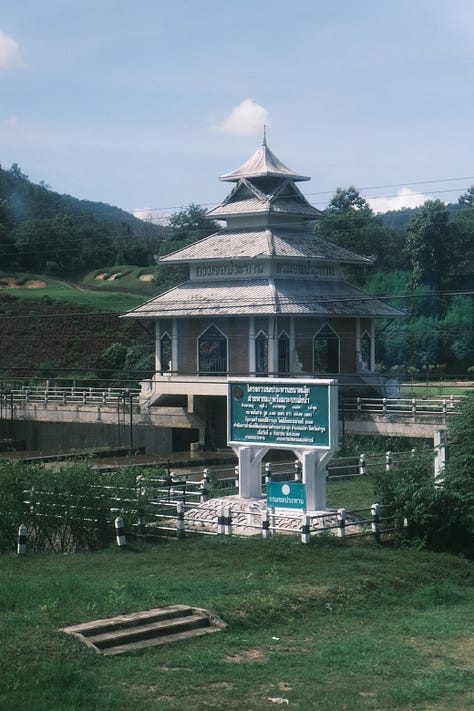
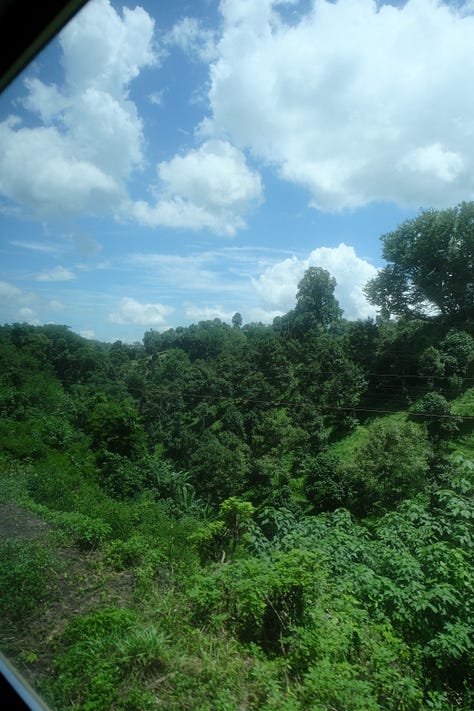
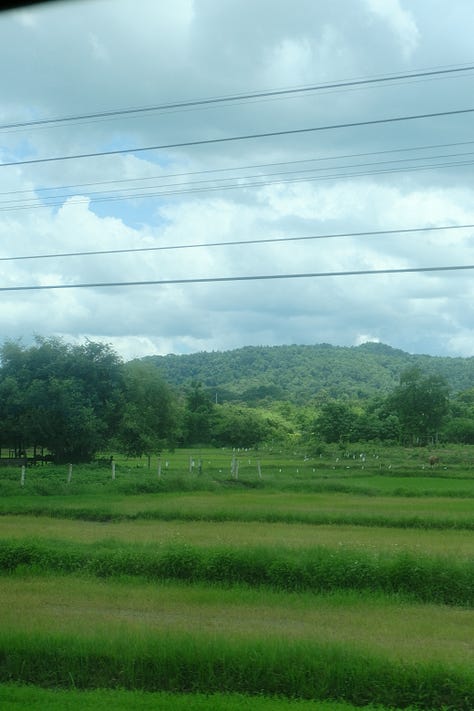
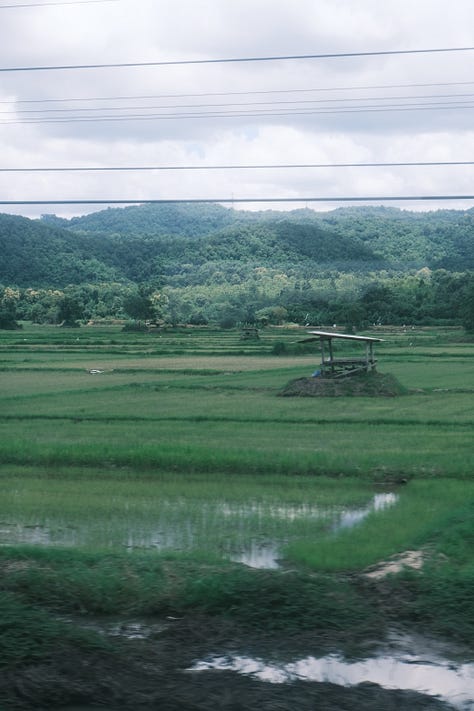
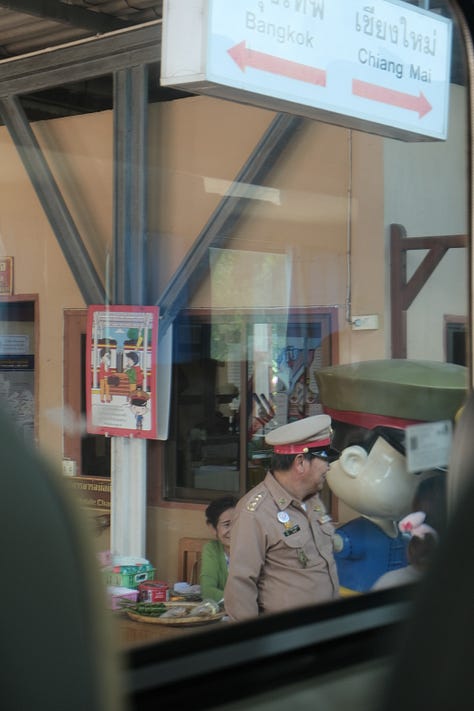
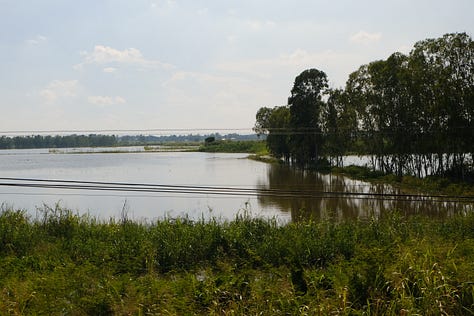
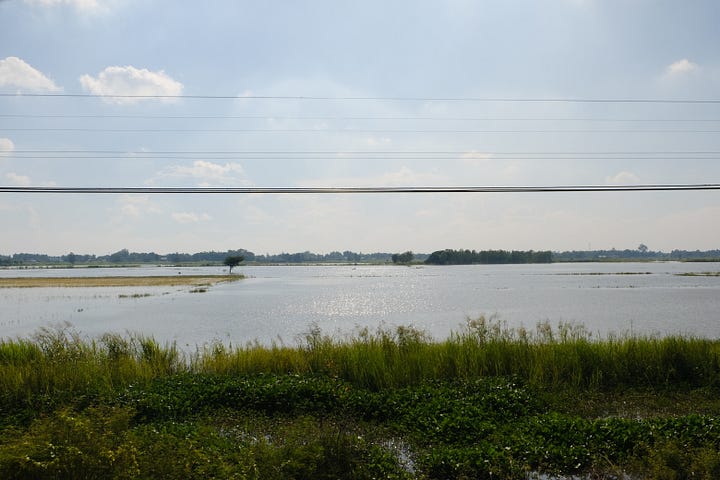
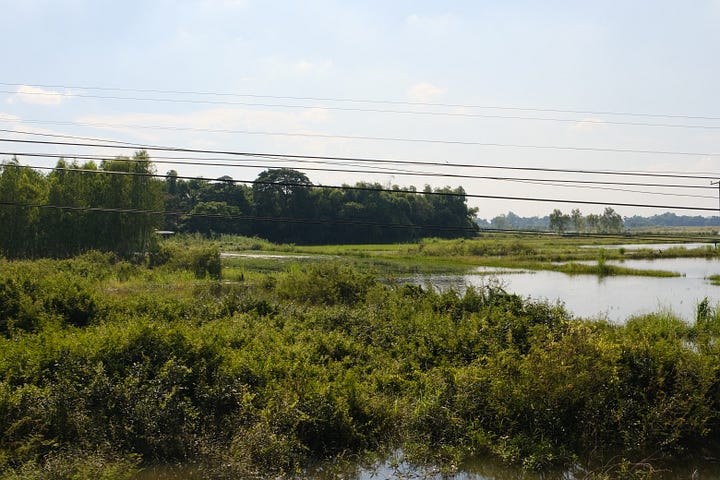
The train suddenly plunges into a thick fog that envelops us. It clings all around from the rice paddies to the distant trees. The sun vanishes completely. An eerie stillness washes over the countryside. It feels like I’m in a horror film.
Fires from burning rice fields, their acrid smoke swirling around us. This is a grim reality faced across Asia. In my family hometown of Chiang Mai, the air quality becomes so bad that people die every year from it. The city, nestled in a basin, becomes a trapped vessel of smoke, unable to breathe as it festers under a pressure system that suffocates any escape.
The destruction of human activity seeps into our carriage. Wisps of smoke slip through the poorly-sealed window edges and unfurl above me like phantom figures. It smells of burned hair. My throat hurts, my eyes water.
I am soon publishing a video about rice burning practices in Vietnam, be sure to follow to see it!
It’s night now—hour ten or eleven. We were meant to arrive by now, but we’re still over 200km away from Bangkok. The train broke down and was hauled to a rail house for repairs. They won’t tell us what’s wrong. The power has been cut. No more fans or air conditioning. The conductors leave the side doors wide open. It’s getting hot. I try to go to the toilet to pee, but that same conductor who I aggravated before blocks my path. He points firmly back at my seat.
“I need the toilet” I say, throwing up a fanfare of disbelief with my arms.
He just points again unyieldingly. I roll my eyes and go back to my seat like a stroppy child. Almost immediately after, a few locals go to the toilet, and he waves them through. What did I do? I lean my head against the window and look out towards the small pile of scree and the turn-of-the-century steam crane locomotive on the track parallel to us. “Thomas Smith & Sons. Leeds” its nameplate reads. As if I need to be taunted by what is surely the only British object in the entire interior of Thailand.
We watch as the shadow of the setting sun deepens across the train yard and swallows the last light of day. On the other side of the train, the sunset is obscured by a massive pile of scree which extends at least a kilometre. So much for that breath-taking sunset I envisioned in my head for this journey.
Over the next few hours we pass through the ancient city of Ayutthaya, right by its ancient temples and spires. We glide across the bridge from which you can see one of the most mesmerising views of the entire archaeological site. We ebb slowly through Lopburi, a city infamous for being swarmed with monkeys who are found on every roof, every street, and every telegraph pole. We come within metres of the Bang Pa In royal palace, with stunning traditional pavilions, assembly houses, and temples built on the river with bright colours and awe-inspiring symmetry.
At least I know we did from the map on my phone. Because of our delay, it is pitch black. I’ve joined the legion of the miserable-faced people around me.
What a mistake, what a terrible, terrible mistake I made.
My idealised train ride across the great landscape of Thailand has devolved into a stark first-person encounter with the destructive nature of human activity—the genocide of the Earth and its natural beauty. This moment is a sombre reminder of my ultimate goal in travel and the reason I write about it. I want to illuminate how travel can be a profound learning experience about the most pressing issues facing our world, societies, and cultures. It can ignite collective activism to save our planet and preserve our cultures and traditions. Travel doesn’t have to contribute to destruction; it can be a force for good.
A renewed energy courses through me. The sparkle returns to my eyes. We’re back in our favourite city in the world!
My lessons and tips
Bring plenty of snacks and water from 7-Eleven. There’s not an ample shop at the train station, so you should prepare the night before. Bring enough to get through the scenario of not having a food carriage.
Don’t bring spare cooked meals. I did so and gave myself horrid food poisoning. The carriage can get far too hot to keep food safely.
Bring a hoodie. At times, air conditioning is blasted before being turned off. Expect to go from hot to cold the same way you do when you have a fever.
Buy your tickets in advance, especially if you want to sit together. Tickets sell out a couple weeks before.
If you are spending a long time in Bangkok or Chiang Mai, buying the tickets from the station is cheaper. If not, buy them online from the State Railway to get the best price. Be warned, the website is always down and doesn’t load from some devices.
The journey is advertised as being 10 hours. Ours ended up taking 14 hours because the train broke down. This didn’t seem like a rare occurrence.
Consider bringing a small game or pack of cards.


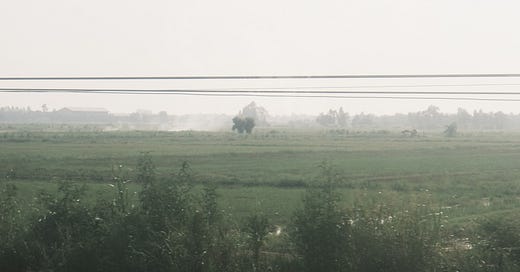



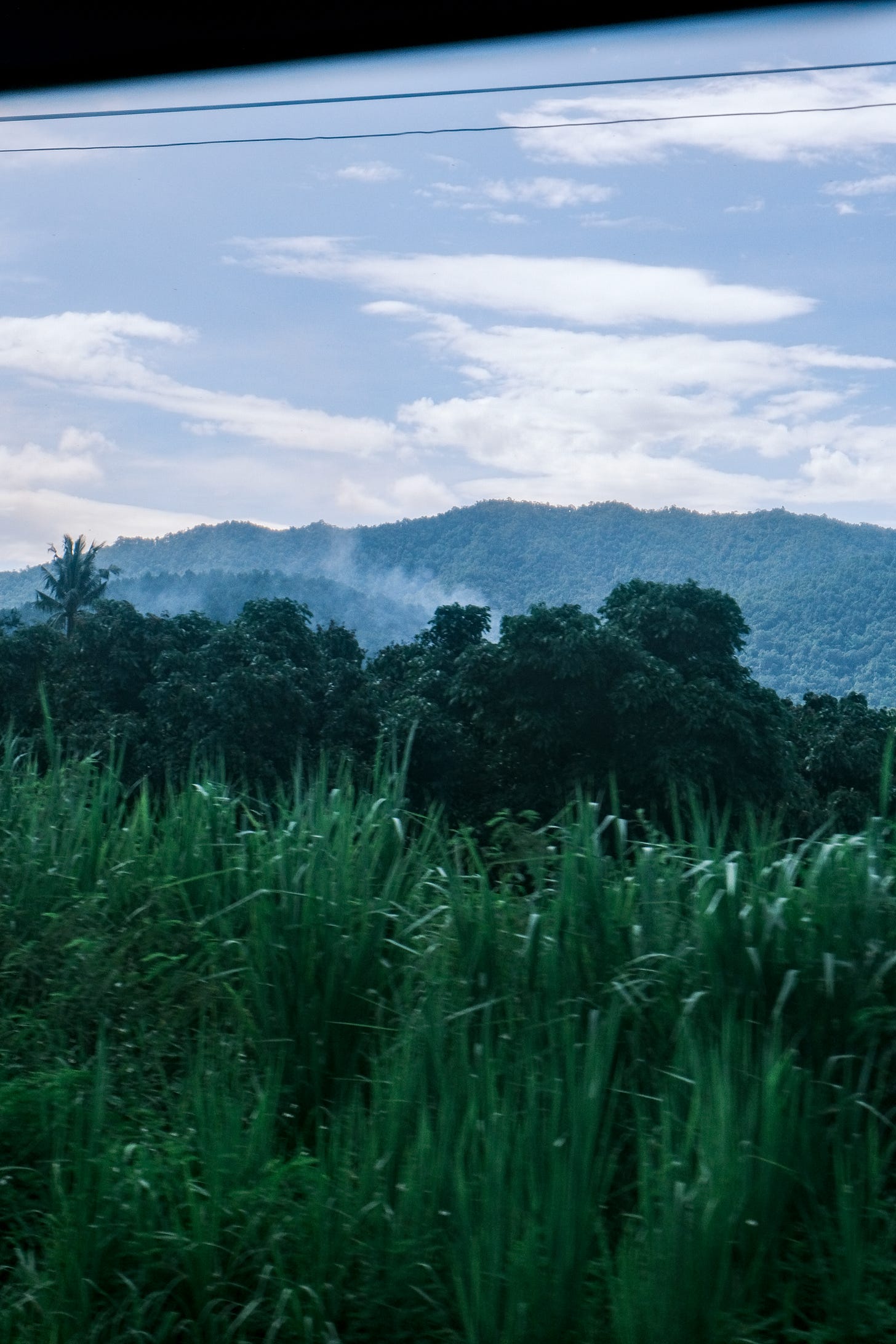
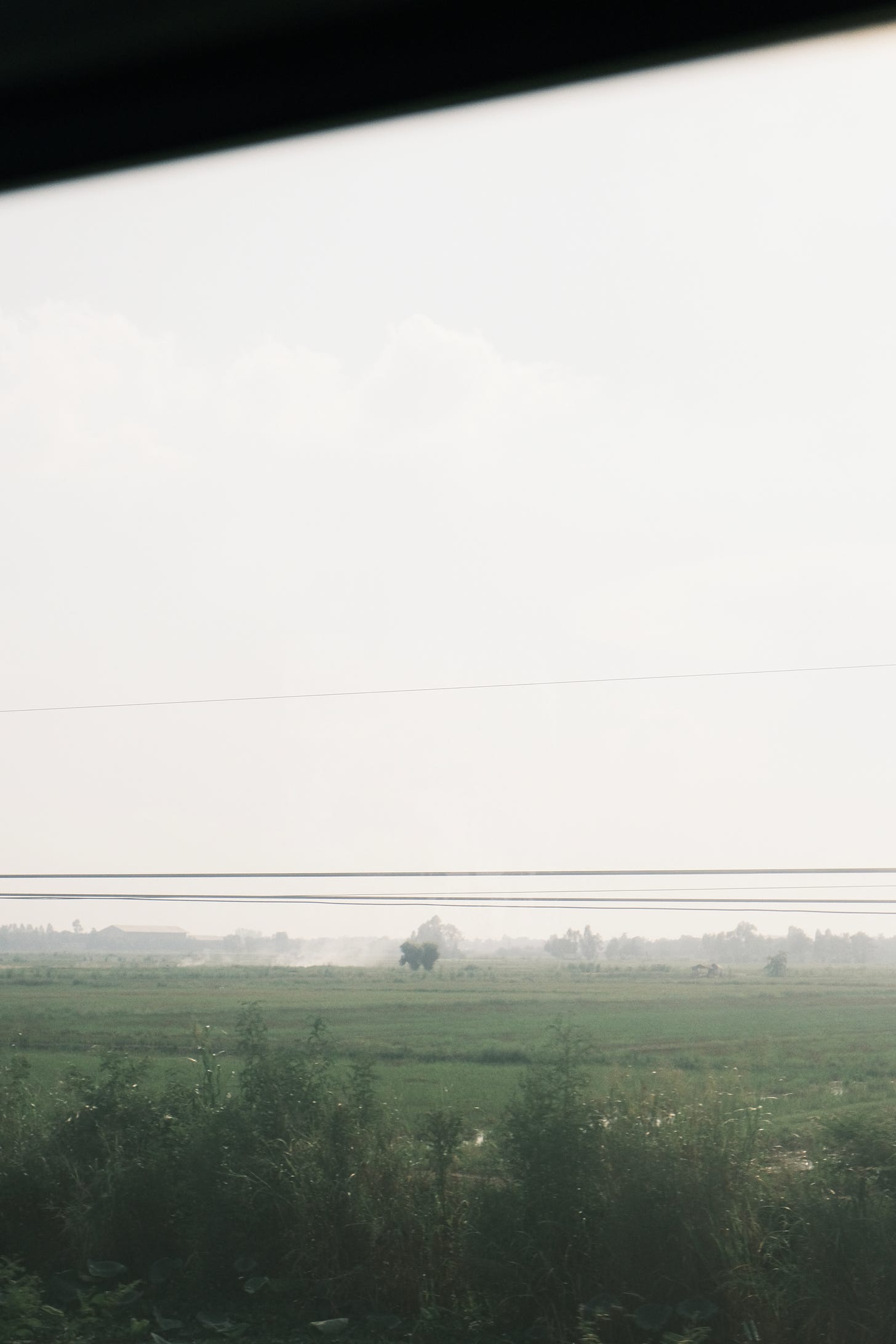
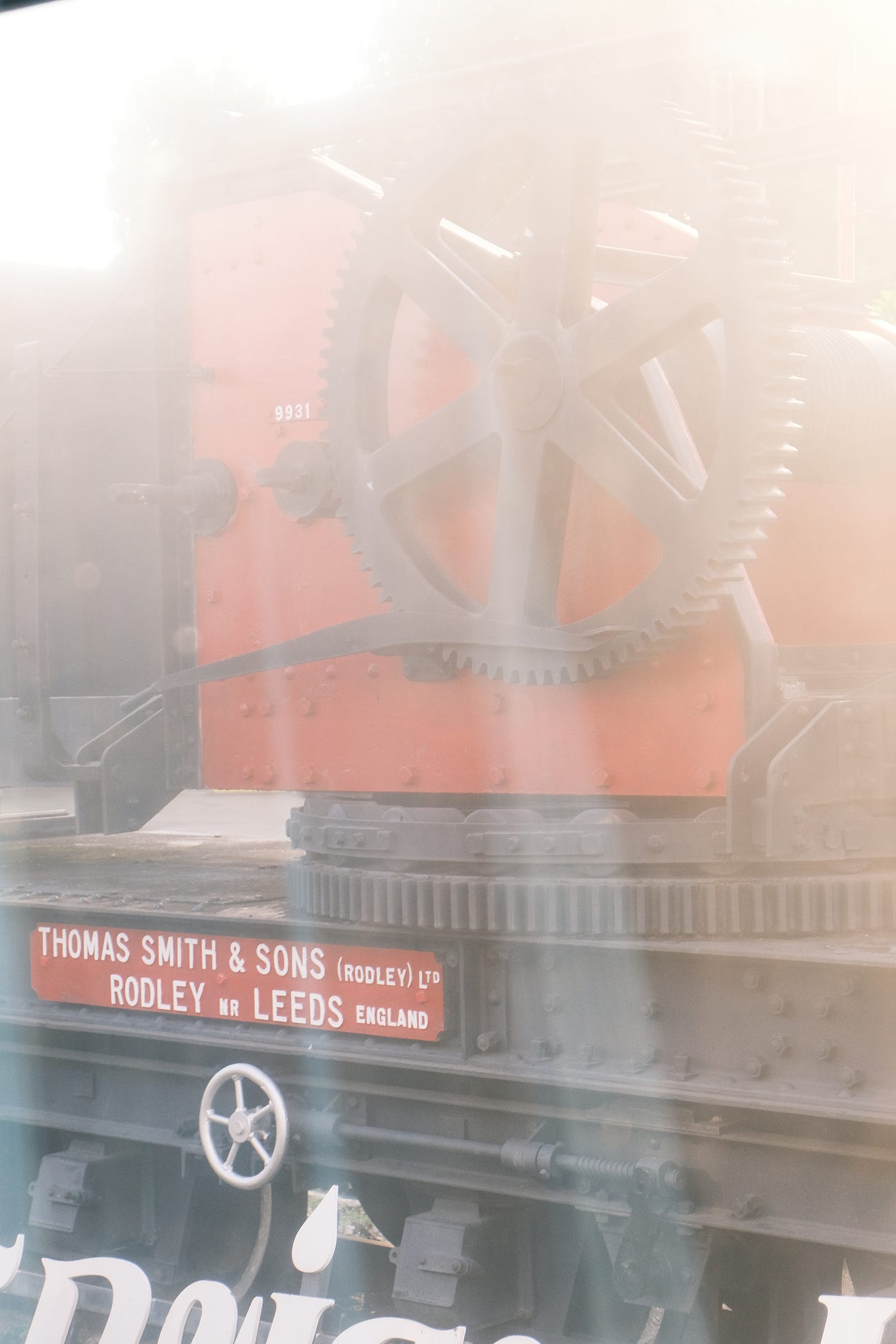
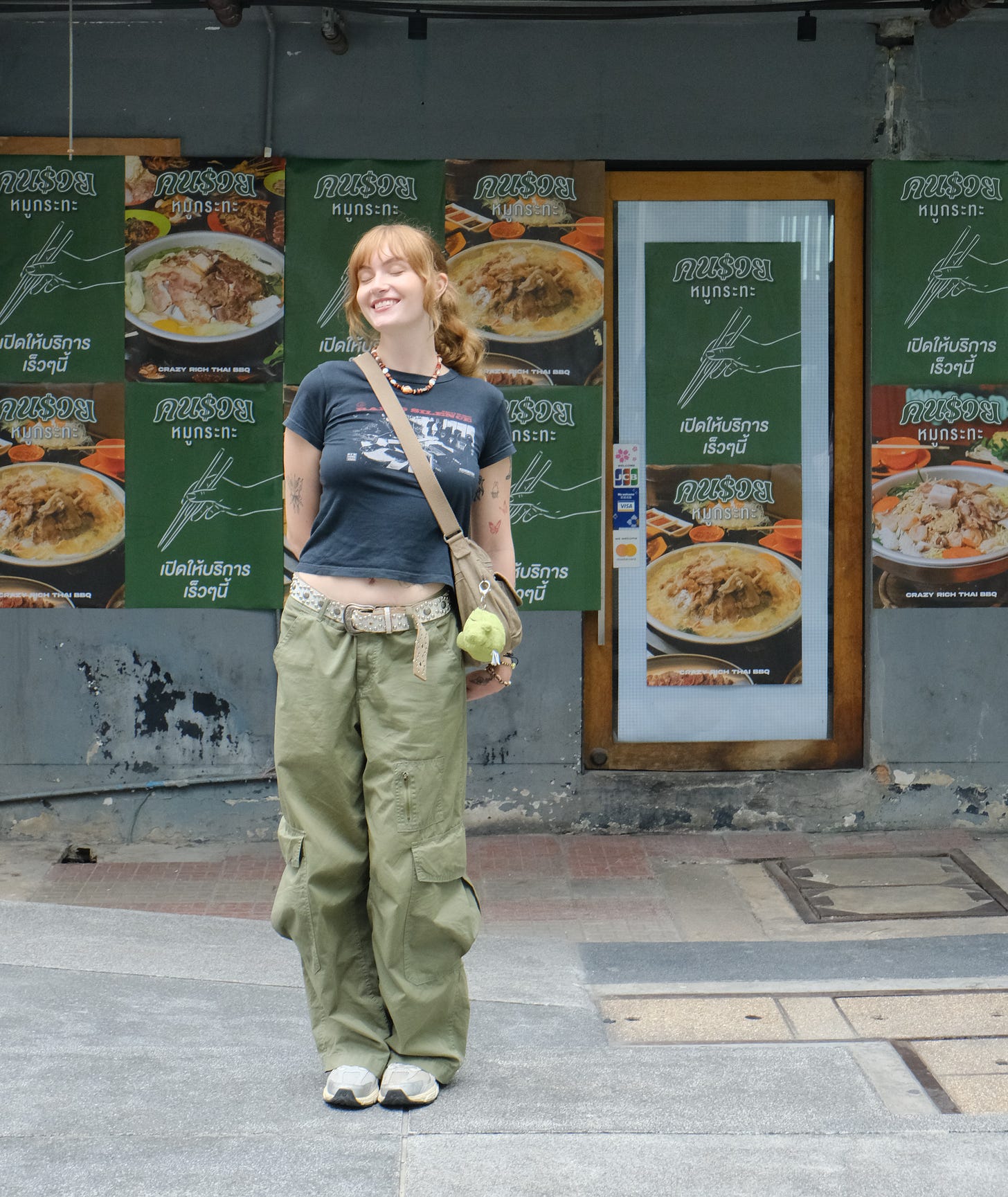
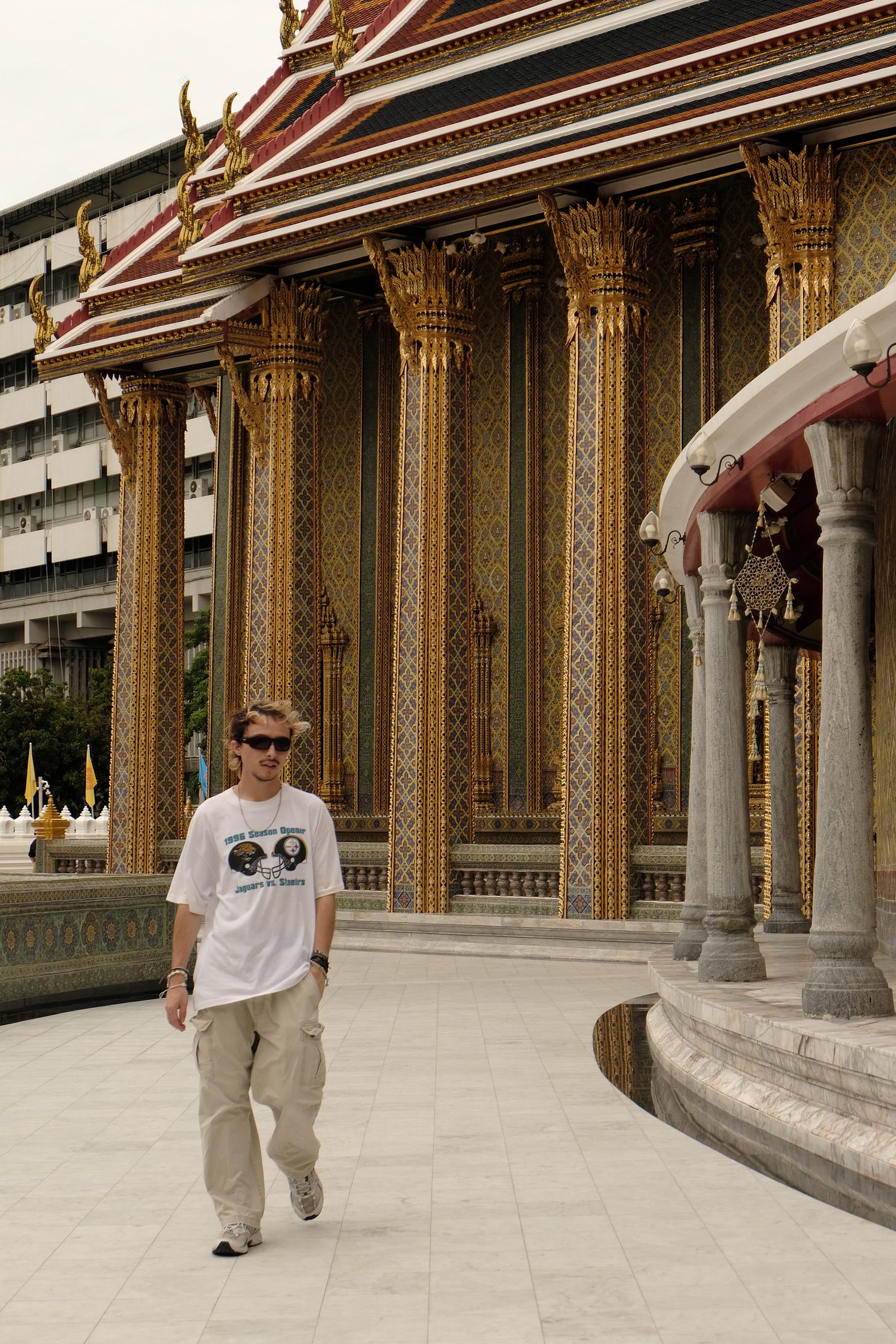
Brave enough 🤣😅